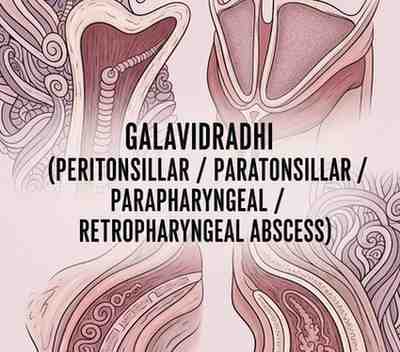
Your Account
Designed by Zeptt Technologies

ETIOLOGY (NIDANA)
AYURVEDIC ETIOLOGY:
Galavidradhi is a type of Vidradhi (abscess) localized in the throat region, especially around the tonsils and adjacent structures. It is mentioned under Mukharoga or Kantharoga in Ayurvedic texts.
DUSHTA AHARA VIHARA – Intake of excessively hot, dry, and spicy food, faulty food combinations
VISHAMASHANA – Irregular food intake
SHEETODAKA SEVANA – Drinking cold water immediately after hot meals
VATA-KAPHA DUSHTI – Leads to accumulation and obstruction in Srotas
RAKTADUSHTI – Contaminated blood leads to inflammatory conditions
AADHYATMIKA / BAHYA HETU – Internal dosha vitiation and external infections both contribute
CLASSICAL REFERENCE:
📜 “शीतोष्णविरुद्धाहारविषमाशनसेविनाम्।
दोषैः कफपित्तार्तैः स्रवद्भिर्गलविद्रधिः॥”
— A.H. Uttara Tantra 16/29
MODERN ETIOLOGY:
Bacterial Infections – Most commonly due to Streptococcus pyogenes
Secondary to Tonsillitis or Pharyngitis
Poor oral hygiene
Injury to throat tissue (e.g., during instrumentation or trauma)
Immunocompromised states – HIV, diabetes
Smoking and chronic irritation
CLINICAL FEATURES (LAKSHANA)
AYURVEDIC CLINICAL FEATURES:
KANṬHASHAITHILYA – Loosening of throat structures
SHOFA (SWELLING) – Localized swelling in tonsillar region
DAHA (BURNING SENSATION)
RUJA (PAIN) – Severe pain while swallowing
KANTHA UKTHA DUKHA – Pain while speaking
TRISHNA – Excessive thirst due to burning
JVARA (FEVER) – Mostly of pittaja type
MUKHA DOURGANDHYA – Foul smell from mouth
CLASSICAL REFERENCE:
📜 “शोफो दारुणवेगोऽयं कण्ठे दुःखाय पीडनः।
स्वरभेदं करोत्येव ज्वरं शूलं च जनयेत्॥”
— Sushruta Samhita, Uttara Tantra 22/5
MODERN CLINICAL FEATURES:
SEVERE THROAT PAIN – Unilateral, radiating to the ear
TRISMUS – Difficulty in opening the mouth
HOT POTATO VOICE – Muffled speech
DROOLING – Due to difficulty in swallowing
UVULAR DEVIATION – Uvula displaced to opposite side
TONSILLAR SWELLING – Usually unilateral
FEVER, CHILLS – With systemic signs of infection
NECK SWELLING AND TENDERNESS – Especially in para- and retropharyngeal abscess
SAMPRAPTI (PATHOGENESIS)
Vata and Kapha doshas vitiated by nidana, along with rakta dushti, lodge in the gala pradesha.
Leads to srotorodha (blockage), inflammation, suppuration → formation of vidradhi (abscess).
📜 “संगृह्य कण्ठदेशे तु पित्तं रक्तं च दूषयेत्।
वातकफसमायुक्तं करोत्येष विद्रधिं गले॥”
— A.H. Uttara Tantra 16/30
TYPES (MODERN CLASSIFICATION)
PERITONSILLAR ABSCESS (QUINSY) – Abscess between tonsil and capsule
PARAPHARYNGEAL ABSCESS – Abscess in lateral pharyngeal space
RETROPHARYNGEAL ABSCESS – Abscess in posterior pharyngeal wall space
DIAGNOSIS
AYURVEDIC:
Nidan Panchaka approach (Nidana, Purvarupa, Rupa, Upashaya, Samprapti)
Visual and palpatory examination of throat swelling and signs
MODERN:
Throat Examination – Uvular deviation, unilateral swelling
CT SCAN OF NECK – Confirms deep neck space abscess
Ultrasound of neck – Especially for retropharyngeal abscess
Blood Tests – Elevated WBC count, CRP
Needle aspiration – Diagnostic and therapeutic
TREATMENT (CHIKITSA)
AYURVEDIC TREATMENT:
SHODHANA (PURIFICATION):
VIRECHANA – In pittaja dominant cases
NASYA KARMA – With Katu-Tikta Dravyas for dosha shodhana in Urdhwajatru
KAVALA/GANDUSHA – Decoctions like Triphala, Yashtimadhu
LEPA (EXTERNAL APPLICATION) – Anti-inflammatory lepa over throat
AGNIKARMA (CAUTERIZATION) – When abscess is mature
VIDRADHI CHIKITSA SUTRA – As in general vidradhi management
CLASSICAL REFERENCE FOR VIDRADHI TREATMENT:
📜 “शस्यते रक्तपित्तघ्नं तिक्तं कषायमेव च।
विद्रधौ शोधनं तैलं तद्वद्द्रव्यं च लेपनम्॥”
— Charaka Samhita, Chikitsa Sthana 12/97
USEFUL HERBAL REMEDIES:
Punarnavadi Kashaya – For Shotha
Triphala Guggulu – Anti-inflammatory and suppurative
Kaishora Guggulu – For blood purification
Nimba, Haridra, Guduchi – As anti-infectives
MODERN TREATMENT:
ANTIBIOTICS – Broad-spectrum (e.g., amoxicillin-clavulanate, clindamycin)
ANALGESICS AND ANTIPYRETICS – For pain and fever
NEEDLE ASPIRATION / I&D (Incision and Drainage) – In mature abscess
HYDRATION AND NUTRITION – Supportive management
TONSILLECTOMY – In recurrent or chronic cases
AIRWAY MONITORING – In retropharyngeal abscess to avoid obstruction
COMPLICATIONS
Airway obstruction
Spread to mediastinum
Septicemia
Jugular vein thrombosis (Lemierre’s syndrome)
Otitis media or mastoiditis (from spread)
PREVENTION
Early treatment of tonsillitis and pharyngitis
Maintain oral hygiene
Avoid irritants (smoking, pollutants)
Timely Ayurvedic management in Prakopa stage (before suppuration)
PROGNOSIS (SAPAYAPYA-ASPAYAPYA)
Saadhya in early stages with proper shodhana and shamana
Kricchrasadhya / Asadhya if complication arises like airway compromise or septicemia